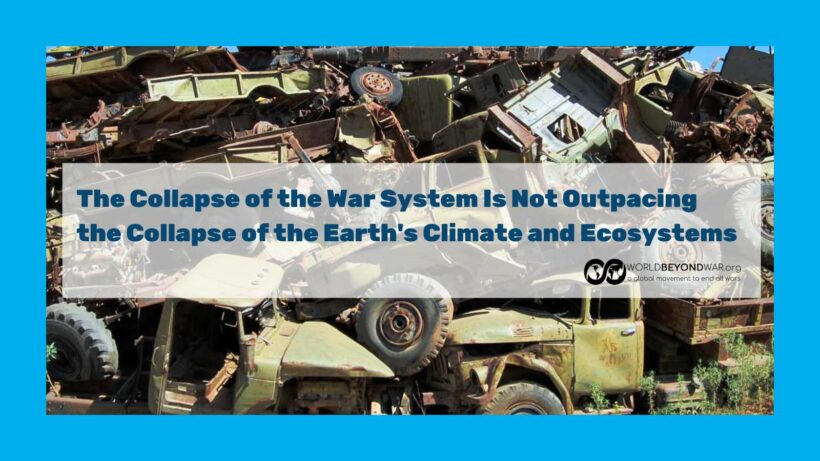The Collapse of the War System: Developments in the Philosophy of Peace in the Twentieth Century by John Jacob English, published in 2007, describes the collapse, or the beginning of the collapse, in Western culture, of the inevitability of war. In other words: the popularization of the idea that war might be ended. Unfortunately, we cannot yet recount the collapse of the practice of war, with war spending, weapons dealing, conflict between major militaries, and the risk of nuclear apocalypse all on the rise. While people in the United States afflicted with televisions are focused on the collapse of Donald Trump, the Earth’s ecosystems are collapsing at the rate at which we need barbaric practices to collapse.
It’s a funny word, barbaric. I use it to mean stupid and violent. But it can also mean foreign. The notion that the foreign is stupid or violent is a central pillar of the war system, and a weakness in most Western analyses thereof. Many human cultures have not included a war system, few have given war the prominence given it by the West, and none have devoted themselves to war with weapons and levels of destruction remotely approaching those of the culture in which the war system is rumored to be collapsing.
To be more accurate, it’s not Westernism or Eurocentrism that limits analysis of peace thinking, but imperio-centrism. Asian and other societies are given consideration, as long as they have made use of war. Indigenous cultures that have not used war are not mentioned.
But John Jacob English’s book is a great introduction to how some people on Earth got (back) to the point of widespread questioning of war. The subtopics in this field are so numerous and rich, that the first section of the book consists of numerous very short summaries of ideas and authors, each a prompt for further study. Four topics receive longer treatment: Tolstoy, Russell, Gandhi, and Einstein. Yes, they’re all male and dead, and perhaps such a book couldn’t have been published in 2023, and probably — on balance — that’s a good thing. But there remain on Earth many millions of people who have not overcome the war-thinking that those four guys, to varying degrees, overcame.
It can potentially be helpful to someone announcing their very original justification for arming Ukraine to discover that the same thing was articulated more clearly 1700 years ago and decisively debunked 100 years ago. At least one has to hope that that would be the case if people were to read books. Here are some to start with:
The War Abolition Collection:
War Is Hell: Studies in the Right of Legitimate Violence, by C. Douglas Lummis, 2023.
The Greatest Evil Is War, by Chris Hedges, 2022.
Abolishing State Violence: A World Beyond Bombs, Borders, and Cages by Ray Acheson, 2022.
Against War: Building a Culture of Peace by Pope Francis, 2022.
Ethics, Security, and The War-Machine: The True Cost of the Military by Ned Dobos, 2020.
Understanding the War Industry by Christian Sorensen, 2020.
No More War by Dan Kovalik, 2020.
Strength Through Peace: How Demilitarization Led to Peace and Happiness in Costa Rica, and What the Rest of the World Can Learn from a Tiny Tropical Nation, by Judith Eve Lipton and David P. Barash, 2019.
Social Defence by Jørgen Johansen and Brian Martin, 2019.
Murder Incorporated: Book Two: America’s Favorite Pastime by Mumia Abu Jamal and Stephen Vittoria, 2018.
Waymakers for Peace: Hiroshima and Nagasaki Survivors Speak by Melinda Clarke, 2018.
Preventing War and Promoting Peace: A Guide for Health Professionals edited by William Wiist and Shelley White, 2017.
The Business Plan For Peace: Building a World Without War by Scilla Elworthy, 2017.
War Is Never Just by David Swanson, 2016.
A Global Security System: An Alternative to War by World Beyond War, 2015, 2016, 2017.
A Mighty Case Against War: What America Missed in U.S. History Class and What We (All) Can Do Now by Kathy Beckwith, 2015.
War: A Crime Against Humanity by Roberto Vivo, 2014.
Catholic Realism and the Abolition of War by David Carroll Cochran, 2014.
War and Delusion: A Critical Examination by Laurie Calhoun, 2013.
Shift: The Beginning of War, the Ending of War by Judith Hand, 2013.
War No More: The Case for Abolition by David Swanson, 2013.
The End of War by John Horgan, 2012.
Transition to Peace by Russell Faure-Brac, 2012.
From War to Peace: A Guide To the Next Hundred Years by Kent Shifferd, 2011.
War Is A Lie by David Swanson, 2010, 2016.
Beyond War: The Human Potential for Peace by Douglas Fry, 2009.
Living Beyond War by Winslow Myers, 2009.
The Collapse of the War System: Developments in the Philosophy of Peace in the Twentieth Century by John Jacob English, 2007.
Enough Blood Shed: 101 Solutions to Violence, Terror, and War by Mary-Wynne Ashford with Guy Dauncey, 2006.
Planet Earth: The Latest Weapon of War by Rosalie Bertell, 2001.
Boys Will Be Boys: Breaking the Link Between Masculinity and Violence by Myriam Miedzian, 1991.






